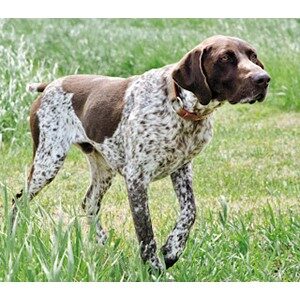German Wirehaired Pointer Dog Bed
Your GWP Deserves a Comfortable Bed!
Introduction
German Wirehaired Pointer dog bed takes into account their health conditions, sleeping style and preferences. A memory foam dog bed is best for health reasons.
The German Wirehaired Pointer (GWP) is a versatile and hardworking dog breed celebrated for its intelligence, energy, and loyalty. Developed in Germany during the 19th century, the GWP was bred to be the ultimate all-purpose hunting companion, capable of tracking, pointing, and retrieving in a variety of terrains and weather conditions.
This breed’s rugged, wiry coat and webbed feet make it well-suited for outdoor adventures, whether in the field, forest, or water. Beyond their hunting prowess, GWPs are also beloved family companions, forming deep bonds with their owners and showing an affectionate, playful side when off duty. While GWPs are intelligent and trainable, they require a committed owner who can meet their high energy levels and provide consistent training.
These dogs thrive in active households that offer plenty of exercise and mental stimulation. They are not well-suited for sedentary lifestyles or small living spaces unless their exercise needs are met through daily activities and engagement.
Their independent streak and strong prey drive can pose challenges for inexperienced dog owners, but with proper guidance, GWPs excel in obedience, agility, and other canine sports.
Socialization from an early age is crucial to help GWPs grow into well-mannered and confident adults. They tend to be friendly yet protective, making them excellent watchdogs.
Whether you’re an avid outdoors enthusiast or a family looking for an active, loving companion, the German Wirehaired Pointer offers the perfect mix of energy, intelligence, and loyalty.
In this guide, we share information about the German Wirehaired Pointer which new owners may not know about. The information included is best dog bed types, brands, facts, fun facts, health conditions, behaviors, tips, costs of ownership and safe foods and foods to avoid.
Video: Pros and Cons
This video shares the pros and cons of the German Wirehaired Pointer to help new owners to know what is expected of them before buying one.
Best Dog Bed Types
Here’s a list of the best dog bed types for German Wirehaired Pointers:
- Orthopedic Dog Beds These are great for supporting their joints, especially as they age. Look for memory foam or high-density foam beds.
- Chew-Resistant Beds German Wirehaired Pointers can be playful and occasionally destructive. Durable, chew-resistant options are ideal.
- Bolster Beds Beds with raised edges or bolsters provide a sense of security and can be great for dogs that like to rest their head on something.
- Elevated Dog Cots Perfect for outdoor use or in warmer climates, these beds offer good ventilation and keep your dog off the ground.
- Waterproof Beds Given their active nature and love for outdoor activities, waterproof or water-resistant beds are easy to clean and maintain.
- Washable Beds Ensure the bed has a removable, machine-washable cover for easy cleaning.
- Cooling Beds For warm seasons or active dogs prone to overheating, consider cooling gel or breathable fabric beds.
Dog Bed Brands
Here are some excellent dog bed brands and features for German Wirehaired Pointers:
Orthopedic Dog Beds
- Big Barker
- Features: High-grade orthopedic foam, 10-year no-flatten warranty, machine-washable microfiber cover.
- Best for: Large, active, or senior dogs with joint issues.
- PetFusion Ultimate Dog Bed
- Features: Memory foam base, water-resistant liner, durable polyester cover.
- Best for: Dogs needing joint support and comfort.
- CertiPUR-US Seal: When shopping for an orthopedic or memory foam bed be sure to look for the CertiPUR-US seal. The seal means that the materials used do not contain any toxins or chemicals that are harmful to pets or humans.
Chew-Resistant Beds
- K9 Ballistics Tough Dog Bed
- Features: Chew-proof material, waterproof liner, and rip-resistant cover.
- Best for: Pointers who are occasional chewers.
- Kuranda Dog Bed
- Features: Aluminum frame, elevated design, heavy-duty vinyl fabric.
- Best for: Persistent chewers and outdoor use.
Bolster Beds
- Friends Forever Orthopedic Dog Bed
- Features: Memory foam base, cushioned bolsters, water-resistant liner, and machine-washable cover.
- Best for: Dogs that love headrests and cozy spaces.
- BarksBar Orthopedic Bolster Bed
- Features: Memory foam, padded bolsters, non-slip base.
- Best for: Medium to large dogs seeking comfort.
Elevated Dog Cots
- Coolaroo Elevated Pet Bed
- Features: Mesh fabric for airflow, rust-resistant frame, UV-treated fabric.
- Best for: Outdoor lounging and hot climates.
- Veehoo Elevated Dog Bed
- Features: Textilene mesh, powder-coated steel frame, anti-slip feet.
- Best for: Lightweight and portable needs.
Waterproof Beds
- Bedsure Waterproof Dog Bed
- Features: Waterproof liner, durable Oxford fabric cover, non-skid bottom.
- Best for: Mess-prone or outdoor-loving dogs.
- Carhartt Durable Canvas Dog Bed
- Features: Water-repellent duck canvas, durable exterior, washable shell.
- Best for: Rugged and active dogs.
Cooling Beds
- The Green Pet Shop Cooling Mat
- Features: Pressure-activated cooling gel, lightweight and portable.
- Best for: Warm weather or dogs prone to overheating.
- Chillz Cooling Mat
- Features: Non-toxic cooling gel, foldable and easy to store.
- Best for: Travel and seasonal use.
Washable Beds
- MidWest QuietTime Defender Teflon Dog Bed
- Features: Teflon-coated fabric, machine-washable, and stain-resistant.
- Best for: High-maintenance cleaning needs.
- Furhaven Plush Sofa Dog Bed
- Features: Removable, washable cover, plush sleeping surface, orthopedic foam.
- Best for: Cozy and easy-to-clean options.
Facts about German Wirehaired Pointer
Measurements:
- Size: Medium
- Group: Sporting Group
- Height Male: 24 – 26 inches
- Height Female: 22 – 24 inches
- Weight Male: 50 – 70 lbs.
- Weight Female: 56 – 60 lbs.
- Length Male: 32 – 39 inches
- Length Female: 32 – 39 inches
- Lifespan: 14 – 16 years
- Fully Grown: 18 – 24 months
- Colors: Liver & White, Black & White
- Popularity: This breed is considered the 61st most popular in the United States by the American Kennel Club in 2023.
- Intelligence: This breed is ranked as the 44th most intelligent by Professor Stanley Coren at the University of British Columbia.
Facts
1. Origins and Purpose
The German Wirehaired Pointer was developed in Germany in the late 19th century as an all-purpose hunting dog. Breeders aimed for a versatile companion skilled in pointing, retrieving, and tracking across a variety of terrains.
2. Coat Characteristics
Their dense, wiry coat is weatherproof and water-resistant, designed to protect them from brambles, thorns, and harsh weather while working in the field.
3. Distinctive Features
GWPs are easily recognized by their unique facial features, including a beard, mustache, and bushy eyebrows, which give them a rugged, outdoorsy appearance.
4. Size and Build
These dogs are medium to large in size, standing 22 to 26 inches tall at the shoulder and weighing between 50 to 70 pounds. They are muscular and athletic, built for endurance and agility.
5. Intelligence and Trainability
The breed is highly intelligent and eager to learn, making them quick to pick up commands. However, their independence and strong prey drive require consistent and firm training.
6. High Energy Levels
German Wirehaired Pointers are high-energy dogs and need at least 1 to 2 hours of vigorous exercise daily. They thrive with active families who enjoy hiking, running, or hunting.
7. Versatile Hunters
Known for their versatility, GWPs excel in upland bird hunting, waterfowl retrieval, and tracking. They are equally comfortable in forests, fields, and marshlands.
8. Family Companions
Despite their hunting background, GWPs are affectionate and form strong bonds with their families. They are known for their loyalty and protective nature.
9. Longevity and Health
The breed typically lives 12 to 14 years. While generally healthy, they can be prone to hip dysplasia, ear infections (due to their love of water), and eye conditions like progressive retinal atrophy (PRA).
10. “Velcro Dogs”
GWPs are often nicknamed “Velcro dogs” because they love staying close to their people, whether lounging at home or following their owners on outdoor adventures.
11. Strong Work Ethic
Bred for endurance and drive, GWPs are happiest when they have a job to do, whether it’s hunting, obedience training, or participating in dog sports like agility and dock diving.
12. Grooming Needs
Their wiry coat requires weekly brushing and occasional hand-stripping to maintain its texture. They shed minimally, but regular grooming helps keep their coat in top shape.
13. They Have Many Nicknames
Looking for a way to abbreviate the three-word breed name? You can also call the German Wirehaired Pointer a “GWP” or “Wirehair.”
Fun Facts
1. A True Multi-Tasker
The German Wirehaired Pointer can point, retrieve, and track, making it one of the most versatile hunting dogs in the world. It’s like having three dogs in one!
2. Facial Furnishings
Their iconic beard and bushy eyebrows don’t just make them look charming—they also protect their face from brambles and debris when hunting in rough terrain.
3. Water-Loving Dogs
GWPs are excellent swimmers and have webbed feet, which help them navigate water effortlessly. They thrive in waterfowl hunting or simply splashing around for fun.
4. Velcro Companion
They’re called “Velcro dogs” for their habit of sticking close to their humans. Don’t be surprised if your GWP follows you from room to room.
5. Night Vision Masters
With excellent vision adapted for hunting at dawn and dusk, GWPs are well-equipped to spot prey even in low-light conditions.
6. Crossbreed Heritage
The GWP was developed by mixing several breeds, including the Wirehaired Griffon, Pointer, and Pudelpointer, to create a dog that could handle any hunting challenge.
7. Endurance Champs
These dogs are built to go all day long. Their high stamina makes them perfect partners for hunters, runners, and hikers who need a dog that can keep up.
8. Personality Chameleons
While they are bold and independent in the field, GWPs are gentle and affectionate at home, making them adaptable to different environments.
9. Minimal Shedders
Their wiry coat sheds minimally, which is great for keeping your home clean. However, they do require regular grooming to maintain their coat’s texture.
10. Excellent Problem-Solvers
GWPs are smart and independent thinkers. If faced with a challenge, they often figure out clever ways to overcome it—sometimes to their owner’s surprise!
11. Natural Protectors
Their loyal and watchful nature makes them excellent watchdogs. They’re quick to alert their families of anything unusual but are rarely aggressive without cause.
12. A Star in Dog Sports
GWPs excel in canine activities like agility, dock diving, and scent work. Their athleticism and intelligence make them competitive in nearly any sport they try.
Common Health Conditions
The German Wirehaired Pointer (GWP) is generally a healthy and robust breed, but like all dogs, they are prone to certain health conditions. Here are the most common health issues found in GWPs:
1. Hip Dysplasia
- Description: A hereditary condition where the hip joint doesn’t fit properly into the hip socket, causing discomfort and eventual arthritis.
- Symptoms: Limping, difficulty getting up, or reluctance to exercise.
- Management: Weight control, joint supplements, physical therapy, or surgery in severe cases.
2. Elbow Dysplasia
- Description: Abnormal development of the elbow joint, leading to lameness and arthritis.
- Symptoms: Front leg lameness, swelling, or stiffness.
- Management: Anti-inflammatory medications, weight management, and surgery if needed.
3. Progressive Retinal Atrophy (PRA)
- Description: A degenerative eye disorder that eventually leads to blindness.
- Symptoms: Difficulty seeing at night, bumping into objects.
- Management: No cure, but most dogs adapt well to vision loss with support.
4. Cataracts
- Description: Clouding of the eye lens, affecting vision.
- Symptoms: Cloudy eyes, vision difficulties, or blindness in severe cases.
- Management: Surgery may be required to restore vision.
5. Von Willebrand’s Disease (vWD)
- Description: A blood clotting disorder caused by insufficient von Willebrand factor, a protein needed for clotting.
- Symptoms: Excessive bleeding from injuries, nosebleeds, or prolonged bleeding during surgery.
- Management: Controlled with medications or by taking precautions to avoid injury.
6. Ear Infections
- Description: Their floppy ears and love of water can make them prone to ear infections due to trapped moisture.
- Symptoms: Scratching ears, head shaking, redness, or a foul odor.
- Management: Regular ear cleaning and ensuring ears are dry after swimming or baths.
7. Hypothyroidism
- Description: An underactive thyroid gland that slows metabolism.
- Symptoms: Weight gain, lethargy, dry skin, or hair loss.
- Management: Lifelong thyroid hormone replacement therapy.
8. Gastric Dilatation-Volvulus (GDV) or Bloat
- Description: A life-threatening condition where the stomach fills with gas and twists, cutting off blood flow.
- Symptoms: Swollen abdomen, restlessness, drooling, or unsuccessful attempts to vomit.
- Management: Immediate veterinary care; preventive gastropexy surgery can reduce risk.
9. AllergiesDescription: GWPs may suffer from food or environmental allergies.
- Symptoms: Itchy skin, excessive licking, ear infections, or gastrointestinal upset.
- Management: Dietary adjustments, antihistamines, or allergy testing.
10. Osteochondritis Dissecans (OCD)
- Description: A joint condition caused by improper cartilage growth, leading to lameness and pain.
- Symptoms: Limping, stiffness, or pain in the joints, especially in young, growing dogs.
- Management: Rest, weight control, or surgery for severe cases.
11. Cancer
- Description: Like many breeds, GWPs may be predisposed to certain cancers, especially as they age.
- Symptoms: Lumps, weight loss, lethargy, or changes in behavior.
- Management: Treatment options depend on the type of cancer and may include surgery, chemotherapy, or palliative care.
12. Heart Conditions
- Description: Some GWPs may develop heart diseases such as dilated cardiomyopathy or heart murmurs.
- Symptoms: Fatigue, coughing, difficulty breathing, or fainting.
- Management: Medications and regular veterinary monitoring.
Preventive Measures for GWP Owners
- Regular vet checkups, a balanced diet, appropriate exercise, and genetic health testing for breeding stock can help mitigate many of these conditions.
Most Common Behaviors
Here’s a list of common behaviors and traits typical of the German Wirehaired Pointer (GWP):
1. High Energy Levels
- Behavior: GWPs are extremely energetic and require daily physical and mental stimulation. Without enough exercise, they can become restless and destructive.
- Implication: Ideal for active families or individuals who enjoy outdoor activities like hiking, running, or hunting.
2. Strong Prey Drive
- Behavior: As a hunting breed, GWPs have a natural instinct to chase small animals like squirrels or rabbits.
- Implication: They should always be supervised or leashed in unsecured areas and trained with a solid recall command.
3. Independent Thinkers
- Behavior: Bred to work in the field with little direction, GWPs are intelligent and capable of making their own decisions.
- Implication: While this trait is useful in hunting, it can make them stubborn during training if not approached with consistency and positive reinforcement.
4. Loyal and Affectionate
- Behavior: GWPs form strong bonds with their families and are affectionate, often following their owners everywhere.
- Implication: They thrive on companionship and can suffer from separation anxiety if left alone for long periods.
5. Alert and Protective
- Behavior: GWPs are naturally watchful and will alert their families to anything unusual.
- Implication: They make excellent watchdogs, though they are typically not aggressive unless provoked.
6. Friendly but Reserved with Strangers
- Behavior: While not overly aggressive, GWPs may be aloof or cautious around strangers.
- Implication: Early socialization is crucial to help them develop confidence and good manners in unfamiliar situations.
7. Playful and Fun-Loving
- Behavior: They enjoy interactive play, such as fetch or tug-of-war, and often exhibit a goofy side with their families.
- Implication: Regular playtime strengthens their bond with their owners and helps burn off energy.
8. Highly Intelligent
- Behavior: GWPs are quick learners and excel in obedience, agility, and other dog sports.
- Implication: Mental stimulation through training and problem-solving activities is essential to keep them engaged and happy.
9. Water Lovers
- Behavior: Their love for water is instinctive, making them enthusiastic swimmers and retrievers in wet environments.
- Implication: Access to safe swimming opportunities can provide excellent exercise and enjoyment.
10. Pack-Oriented
- Behavior: They thrive in social settings and prefer to be part of the family “pack.”
- Implication: They do well with other dogs when properly introduced but may not always get along with smaller pets due to their prey drive.
11. Mischievous When Bored
- Behavior: A bored GWP is likely to find its own entertainment, often in the form of chewing, digging, or other destructive behaviors.
- Implication: They need regular activities to keep their minds and bodies occupied.
12. Sensitive to Training Methods
- Behavior: GWPs respond best to positive reinforcement and may shut down or resist if training is overly harsh.
- Implication: Use patience, consistency, and rewards to bring out the best in them during training.
13. Persistent and Determined
- Behavior: They show persistence in tasks, especially when tracking or hunting.
- Implication: This can be a strength in hunting but may require careful management in everyday situations to prevent over-fixation.
14. Calm Indoors (When Exercised)
- Behavior: Once their exercise needs are met, GWPs are calm and relaxed indoors, often enjoying cuddling with their owners.
- Implication: A well-exercised GWP is a delightful house companion.
15. Love for Challenges
- Behavior: They thrive on tasks that test their skills, whether it’s finding a hidden toy, learning a new command, or navigating an agility course.
- Implication: Regular challenges and structured activities help prevent boredom and reinforce good behavior.
Tips for New Owners
Here are some helpful tips for new German Wirehaired Pointer (GWP) owners:
1. Provide Plenty of Exercise
- GWPs are high-energy dogs and require at least 1-2 hours of daily exercise. Long walks, runs, swimming, or hiking are great ways to keep them physically and mentally stimulated.
- Activities like agility, fetch, or hunting training can channel their energy positively.
2. Start Training Early
- Begin obedience training as soon as possible. GWPs are intelligent and eager to learn, but their independence can make them stubborn.
- Use positive reinforcement techniques like treats, praise, and play to encourage desired behaviors.
3. Socialization is Key
- Introduce your GWP to a variety of people, places, and other animals early to ensure they grow into well-rounded adults.
- This helps curb shyness or aloofness around strangers.
4. Prepare for Their Prey Drive
- Their strong prey drive means they may chase small animals like squirrels or cats.
- Always use a leash or keep them in a secure, fenced area when outdoors. A reliable recall command is essential for off-leash situations.
5. Mental Stimulation is Crucial
- In addition to physical activity, GWPs need mental challenges. Puzzle toys, scent games, and advanced training can help prevent boredom.
- Engaging their mind is just as important as exercising their body.
6. Create a Routine
- GWPs thrive with structure. Establish consistent feeding, training, and exercise schedules to help them feel secure.
- Routine helps curb unwanted behaviors caused by anxiety or confusion.
7. Grooming Maintenance
- Brush their wiry coat weekly to prevent mats and keep it healthy. Occasional hand-stripping may be needed to maintain their coat’s texture.
- Clean their ears regularly to prevent infections, especially if they swim often.
8. Provide a Job
- These dogs were bred to work and are happiest when given a task. Training them in hunting, scent work, or even advanced obedience gives them a sense of purpose.
- If you’re not a hunter, consider enrolling them in dog sports like agility or dock diving.
9. Be Patient and Consistent
- GWPs are sensitive dogs and may shut down with harsh training methods. Use patience, consistency, and rewards to encourage good behavior.
- Keep training sessions short and fun to maintain their interest.
10. Prevent Separation Anxiety
- Because of their strong bond with their families, GWPs can develop separation anxiety. Gradually get them used to being alone by starting with short periods.
- Leave them with engaging toys or puzzles to keep them occupied when you’re away.
11. Provide Proper Nutrition
- Feed a high-quality, balanced diet appropriate for their age, size, and activity level.
- Avoid overfeeding, as GWPs can be prone to joint issues like hip dysplasia, which can worsen with excess weight.
12. Secure Your Yard
- Ensure your yard is securely fenced, as GWPs are athletic and can jump or dig to escape if they’re bored or spot something interesting.
13. Monitor Their Health
- Schedule regular veterinary checkups and keep up with vaccinations, flea/tick prevention, and deworming.
- Be proactive about screening for conditions like hip dysplasia, PRA, and other breed-specific health concerns.
14. Commit to Their Lifelong Needs
- GWPs are a 12-14 year commitment. They thrive in active homes where they can get the attention, activity, and companionship they need.
- Make sure your lifestyle matches their energy and care requirements before bringing one home.
15. Bond Through Adventure
- Take your GWP on adventures—they love being part of the action. Whether it’s a camping trip, a swim at the lake, or a jog in the park, they’ll enjoy spending time with you.
Costs of Ownership
The average costs of owning a German Wirehaired Pointer (GWP) can vary based on location, lifestyle, and the specific needs of the dog. Here’s a breakdown of the initial, annual, and lifetime costs:
1. Initial Costs
- Purchase or Adoption Fee
- Breeder Price: $1,000–$2,500 (depending on pedigree, breeder reputation, and location).
- Adoption Fee: $200–$500 (from a rescue or shelter).
- Initial Supplies
- Crate: $50–$150.
- Bed: $30–$100.
- Collar and Leash: $20–$50.
- Food and Water Bowls: $10–$30.
- Toys: $20–$50.
- Grooming Supplies: $30–$70.
- Total Initial Supplies: $160–$450.
- Spay/Neuter Surgery
- Cost: $150–$500 (depends on location and veterinary clinic).
- Microchipping
- Cost: $25–$50.
- Initial Vet Visit
- Vaccinations, Exam, Deworming: $100–$300.
Estimated Total Initial Costs: $1,500–$4,000.
2. Recurring Annual Costs
- Food
- Cost: $400–$800 annually (depending on brand and size of the dog).
- Preventative Veterinary Care
- Routine Checkups, Vaccinations, Flea/Tick Prevention, Heartworm Prevention: $300–$600 annually.
- Grooming
- DIY Grooming Supplies: $50–$100 annually.
- Professional Grooming (if needed): $50–$100 per session (2–4 sessions a year = $100–$400 annually).
- Training
- Basic Obedience Classes: $100–$300 per course (especially important in the first year).
- Pet Insurance
- Cost: $200–$600 annually (varies based on coverage).
- Toys and Accessories
- Cost: $50–$150 annually.
- Miscellaneous (Treats, Replacement Supplies)
- Cost: $100–$300 annually.
Estimated Annual Costs: $1,200–$2,850.
3. Lifetime Costs
The average lifespan of a GWP is 12–14 years, so the total lifetime cost can be estimated by adding the initial costs and annual costs multiplied by their lifespan:
- Lifetime Cost Range: $15,900–$43,900.
Optional/Additional Costs
- Dog Sports or Advanced Training: $200–$1,000 annually.
- Boarding or Pet Sitting: $25–$75 per day (when you’re traveling).
- Emergency Veterinary Care: $1,000–$5,000 per incident.
- Hunting Gear or Specialized Equipment: Varies based on activities.
Cost-Saving Tips
- Consider adopting from a rescue organization.
- Learn to groom your GWP at home.
- Invest in good-quality training early to avoid behavioral issues later.
- Choose a pet insurance plan to offset emergency veterinary costs.
Safe Foods and Foods To Avoid
Like all dogs, GWPs thrive on a balanced diet primarily made for canines. However, they can enjoy certain human foods as treats or supplements in moderation.
Safe Foods
- Lean Meats (Cooked, Unseasoned)
- Chicken, turkey, beef, and lamb are excellent protein sources.
- Avoid bones that can splinter, especially cooked ones.
- Fish
- Salmon (cooked and boneless) and sardines (in water) are rich in omega-3 fatty acids.
- Avoid raw fish or fish with small bones.
- Eggs (Cooked)
- Scrambled, boiled, or fried without oils/spices are good for protein.
- Fruits (Fresh, Washed)
- Apples (remove seeds and core).
- Blueberries, strawberries, raspberries.
- Watermelon (seedless, no rind).
- Bananas (in moderation).
- Vegetables (Cooked or Raw)
- Carrots, green beans, broccoli, and zucchini.
- Sweet potatoes (cooked, no seasoning).
- Plain Yogurt
- A good source of calcium and probiotics; ensure it’s unsweetened and free from xylitol.
- Peanut Butter
- Natural, unsalted, and xylitol-free peanut butter is a great treat.
- Plain Rice and Pasta
- Cooked white or brown rice and plain pasta can be given in small amounts.
- Pumpkin (Plain, Canned or Fresh)
- Great for digestion; avoid pumpkin pie mix.
- Cheese
- In small quantities; low-fat options like mozzarella or cottage cheese are best.
Foods to Avoid for German Wirehaired Pointers
Certain foods are toxic or unhealthy for dogs, and GWPs are no exception.
Toxic Foods
- Chocolate
- Contains theobromine, which is toxic to dogs. Dark chocolate and baking chocolate are especially dangerous.
- Grapes and Raisins
- Can cause kidney failure, even in small amounts.
- Onions and Garlic
- Contain compounds that can damage red blood cells, leading to anemia.
- Xylitol
- Found in sugar-free gum, candy, and some peanut butters; causes insulin spikes and can lead to liver failure.
- Avocado
- Contains persin, which is toxic in large quantities; the pit is also a choking hazard.
- Alcohol
- Even small amounts can cause poisoning and organ damage.
- Caffeine
- Found in coffee, tea, energy drinks, and some medications; can lead to hyperactivity, tremors, and seizures.
- Macadamia Nuts
- Highly toxic; can cause weakness, vomiting, and tremors.
- Raw Dough
- The yeast in raw dough can expand in the stomach, causing bloating and discomfort.
- Fatty Foods
- Fried foods, bacon, or fatty meat trimmings can cause pancreatitis.
- Bones (Cooked)
- Cooked bones can splinter and cause internal injuries.
- Salted or Spicy Foods
- Excessive salt can lead to sodium ion poisoning, while spices can upset their stomach.
- Dairy (in Excess)
- Some dogs are lactose intolerant, leading to digestive upset if they consume too much milk or cream.
- Raw Meat, Eggs, or Fish
- Can carry harmful bacteria like salmonella or parasites.
Tips for Feeding German Wirehaired Pointers
- Always introduce new foods gradually to avoid upset stomachs.
- Treats should make up no more than 10% of their daily caloric intake.
- Keep a list of toxic foods handy and call a vet immediately if ingestion occurs.
- Provide access to fresh, clean water at all times.
Conclusion
Owning a German Wirehaired Pointer is a rewarding experience for those prepared to meet the breed’s unique needs. With their striking appearance, unwavering loyalty, and tireless energy, GWPs are a breed like no other. They excel as working dogs, thriving in roles such as hunting, search and rescue, or even therapy work.
However, their versatility doesn’t stop there. At home, they transform into affectionate, family-oriented dogs that relish spending time with their loved ones. The key to a happy and well-behaved German Wirehaired Pointer is meeting their physical and mental needs.
These dogs require daily exercise, whether it’s a long walk, a jog, or an engaging game of fetch. Activities like agility courses, tracking games, or swimming not only provide an outlet for their energy but also keep them mentally sharp.
Owners who fail to provide sufficient stimulation may find their GWP channeling their energy into destructive behaviors like digging or chewing.
Consistent training, starting from puppyhood, is vital for managing their strong-willed nature and ensuring they become polite members of the household. It’s important to remember that GWPs are not suited for everyone.
They thrive in active households where they can be part of the action and are happiest when given a job to do. First-time dog owners or those with limited time may find this breed’s demands overwhelming.
However, for those who can match their enthusiasm and adventurous spirit, the GWP will reward you with unwavering companionship and a lifetime of memorable experiences. As you embark on this journey with your German Wirehaired Pointer, remember that patience, consistency, and a commitment to their well-being will forge an unbreakable bond.
Whether exploring the great outdoors or relaxing at home after a day of adventure, the GWP is sure to bring joy, laughter, and loyalty to your life. For those ready to embrace the challenges and joys of this remarkable breed, the rewards are endless.
Check out our article on the most popular dog breeds in the United States by clicking on the link.
Shop Dog Beds
You can shop for a dog bed by selecting a bed of interest. You will be taken to Amazon where you can place the order. While there, you can read the customer reviews and answered questions before purchasing.
As an Amazon Associate, I earn from qualifying purchases. Your purchase price is the same as if you shop directly on Amazon.
The price at time of publish is included below to give you an idea of what the price is; however, it is subject to change.
Shop Rectangle Dog Beds
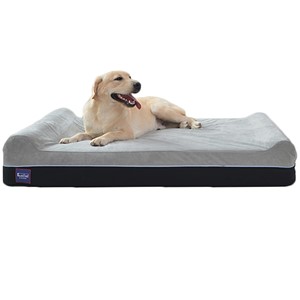
Laifug Large Grey Orthopedic Rectangle Bed
Price At Time of Publish $130.00
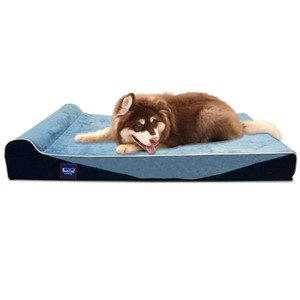
Laifug Large Blue Orthopedic Rectangle Bed
Price At Time of Publish $130.00 $110.00
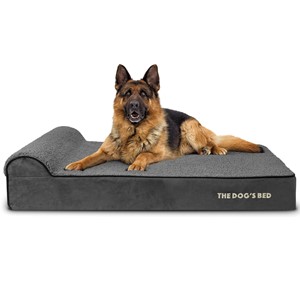
The Dogs Bed XL Grey Orthopedic Rectangle Bed
Price At Time of Publish $130.00 $185.00
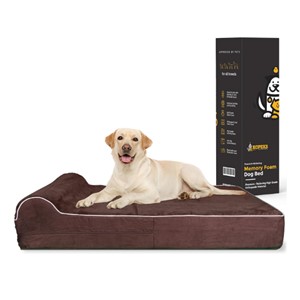
KOPEKS Jumbo Orthopedic Rectangular Bed
Price At Time of Publish $130.00 $110.00
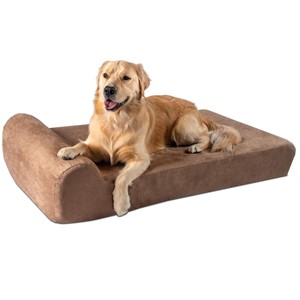
Big Barker XL Orthopedic Rectangle Bed
Price At Time of Publish $130.00 $240.00
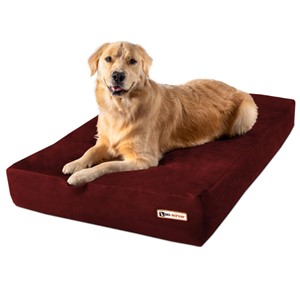
Big Barker XL Burgundy Orthopedic Rectangle Bed
Price At Time of Publish $130.00 $200.00
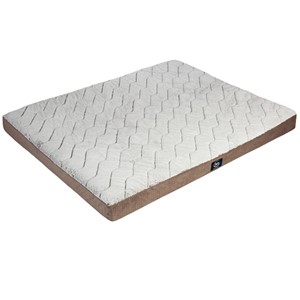
Serta XL Brown Orthopedic Rectangle Bed
Price At Time of Publish $130.00 $80.00
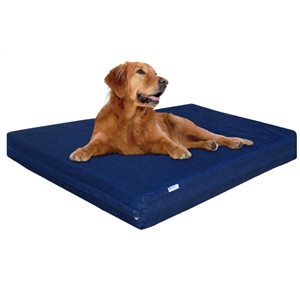
DogBed4Less XL Blue Orthopedic Rectangle Bed
Price At Time of Publish $130.00 $80.00
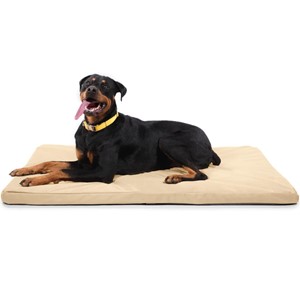
K9 Ballistics XL Sandstone Orthopedic Crate Pad
Price At Time of Publish $130.00 $159.00
Shop Bolster Dog Beds
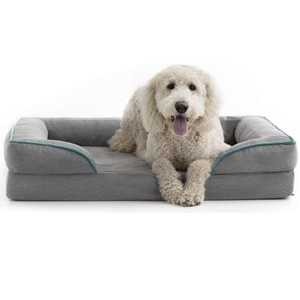
Brindle XL Gray Orthopedic Bolster Bed
Price At Time of Publish $130.00 $79.00
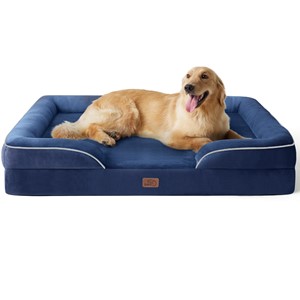
Bedsure XL Blue Orthopedic Bolster Bed
Price At Time of Publish $130.00 $76.00
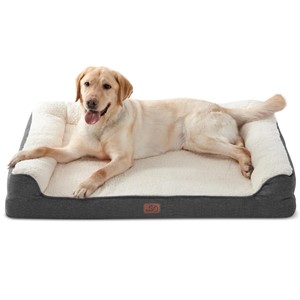
Bedsure XL Grey Orthopedic Bolster Bed
Price At Time of Publish $130.00 $60.00
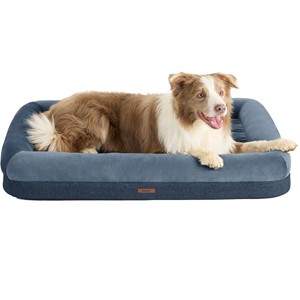
Lesure XL Navy Orthopedic Bolster Bed
Price At Time of Publish $130.00 $40.00
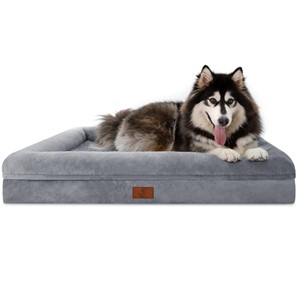
Yiruka XL Grey Orthopedic Bolster Bed
Price At Time of Publish $130.00 $55.00
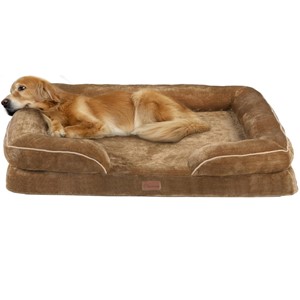
Yitahome XL Brown Orthopedic Bolster Bed
Price At Time of Publish $130.00 $37.00
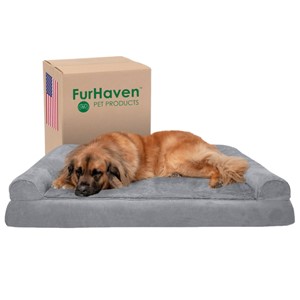
Furhaven XL Gray Orthopedic Bolster Bed
Price At Time of Publish $130.00 $130.00
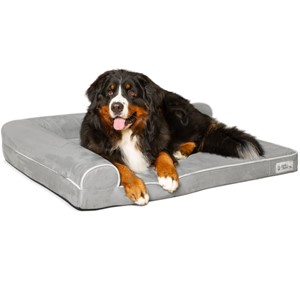
PetFusion XL Grey Orthopedic Bolster Bed
Price At Time of Publish $130.00 $60.00
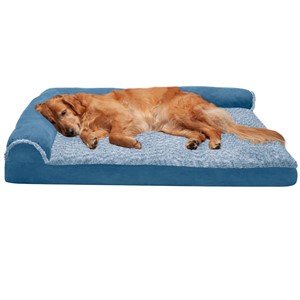
Furhaven Jumbo Blue Orthopedic Bolster Bed
Price At Time of Publish $130.00 $60.00
Shop Elevated Dog Beds
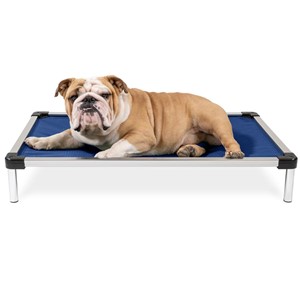
K9 Ballistics Chew Proof Elevated Small Bed
Price At Time of Publish $130.00 $129.00
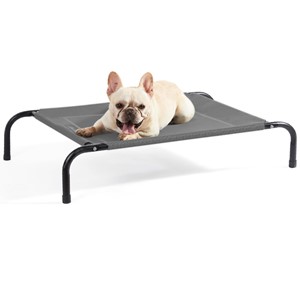
Bedsure Medium Elevated Dog Bed
Price At Time of Publish $130.00 $33.00
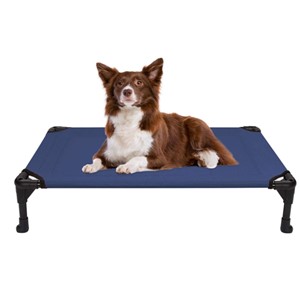
Veehoo Medium Elevated Dog Bed
Price At Time of Publish $130.00 $45.00
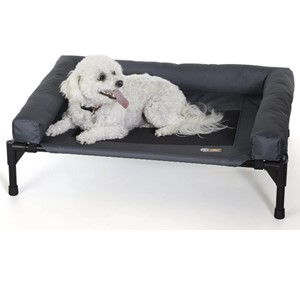
K&H Pet Products Elevated Bolster Dog Bed
Price At Time of Publish $130.00 $57.00
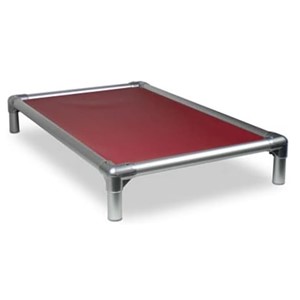
Kuranda Elevated Chew Proof Small Dog Bed
Price At Time of Publish $130.00 $134.00
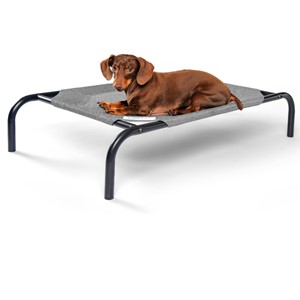
Coolaroo Small Elevated Dog Bed
Price At Time of Publish $130.00 $21.00
Related Articles
Below are some other articles that might interest you. Just select one that you want to learn more about.
- Best Dog Training Toys
- Best Healthy Dog Food Brands
- Dog Training Techniques
- Feeding Dogs Different Life Stages
- How To Train A Puppy
- Positive Reinforcement for Dog Training
- Puppy Proofing Your House
- Using Alexa for Dog Behaviors
Go back to the Dog Luxury Beds home page.
